More than 60 per cent of loose edible oil in market is adulterated: CGSI
More than 60 per cent of loose edible oil in market is adulterated: CGSI
More than 60 per cent of loose edible oil in market is adulterated: CGSI
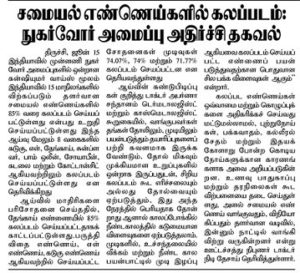
Consumer VOICE study about adulteration in loose edible oil has been widely acclaimed and published by the media across India.
Namathu Marasu

Andhra-Prabha
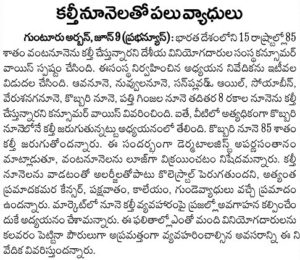
Andhra-Prabha
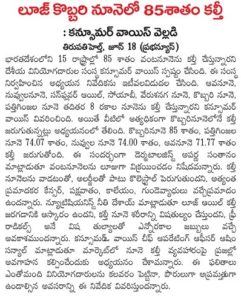
Prajashakti
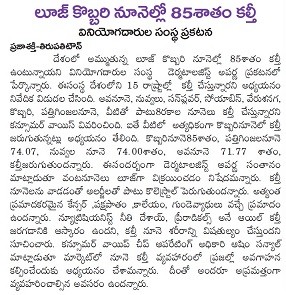
Eenadu
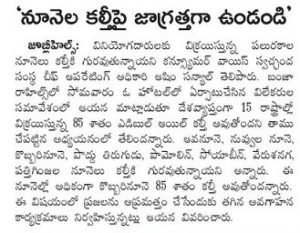
Viduthalai
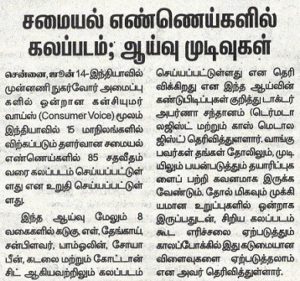
Manam

Janayugom
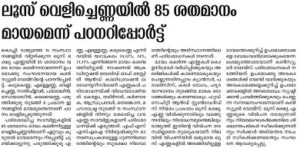
Future Kerala
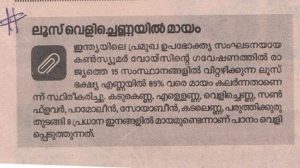
Vishalandhra
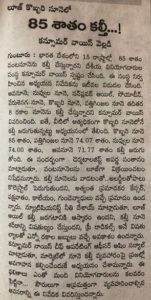
Surya
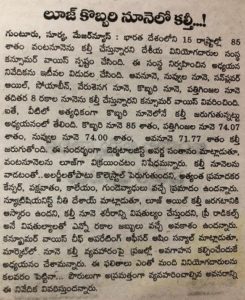
Tamil_Anjal
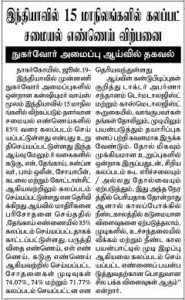
Tamil Anjal
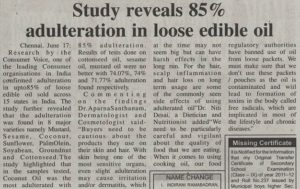
Vaartha

Rampant Adulteration in Loose Edible Oil Sold Openly Despite Ban – Reveals a Report by Ngo Consumer Voice 2016
Highest adulteration found is 85%- coconut oil, 74.07% -cottonseed oil, 74%-sesame oil and 71.77% in mustard oil. If we look for lowest soyabean oil with 20% findings sunflower oil with 16.5 %.
New Delhi: Consumer Voice, the Voluntary Consumer Organization working in interest of consumer education and rights of consumers has recently done laboratory tests of loose edible oils of 8 varieties namely Mustard, Sesame, Coconut, Sunflower, Palmolein, Soyabean, Groundnut and Cottonseed. 1, 015 samples of loose edible oils were taken from 15 states including Delhi. The base of the tests was both on quality and safety parameters as per FSSAI standards and samples were tested at NABL (National Accreditation Board for Testing and Calibration Laboratories) accredited
laboratory. Adulteration in oil can cause diseases like cancer, paralysis, allergy, liver damage cardiac arrest and epidemic dropsy .
The 15 states covered for the samples collections are Delhi, Haryana, Uttar Pradesh, Gujarat, West Bengal, Bihar, Jharkhand, Maharashtra, Kerala, Tamil Nadu, Andhra Pradesh, Telangana, Karnataka, Rajasthan and Madhya Pradesh.
As per Food Safety and Standards (Prohibition and Restrictions on Sales Regulations 2011), no person is allowed to sell, expose to sale, distribute, offer for a sale, dispatch or deliver to anyone edible oils in loose form. Though with the provision that the state government, in public interest, can exempt any or all edible oils from this regulation for a specific period.
“The main objective behind these tests made by Consumer Voice is to draw conclusive evidence based on scientific testing that loose edible oils sold are prone to various kinds of adulterations” said, Mr. Ashim Sanyal, Chief Operating Officer Consumer Voice. “This is true for all varieties of edible oil and cuts across all states where adulteration is done unhindered with no control by state FDA’s” adds Mr. Sanyal.
Based on high salability there were two-types of largest selling variety of oils in loose form that were collected from each state. As per Food Safety and Standard Regulations the checklist for the adulteration includes: visibility, odour, uspended particles argemone oil, unsaponifiable matter etc.
Highest adulteration found is 85%- coconut oil, 74.07% -cottonseed oil, 74%-sesame oil and 71.77% in mustard oil. If we look for lowest soyabean oil with 20% findings sunflower oil with 16.5 %.
The main findings highlighted:
Voluntary consumer organisation, Consumer Voice, has found adulteration in loose edible oil sold in the open market across the country… Read more
It’s the large section of poor buying loose edible oil across the country… Read more